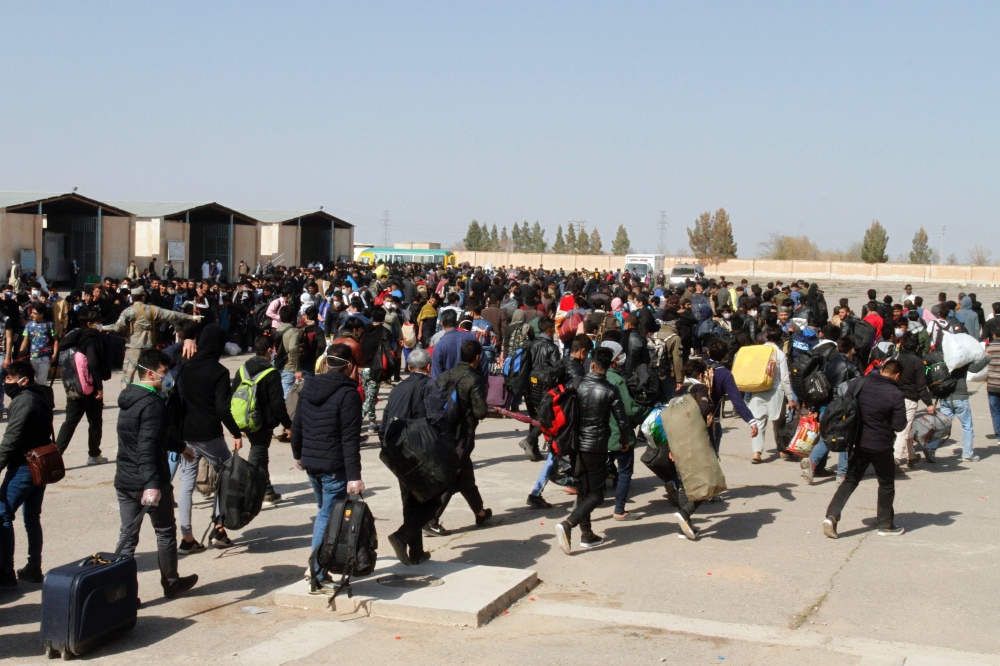
ELLIS HEASLEY, of UK-based religious freedom advocacy CSW, looks at the dangers facing Afghan Christians who have been forced to flee to neighbouring nations…
London, UK
Along with his two sisters and mother, Mahtab saw his father shot and killed in front of his own eyes. He was targeted by the Taliban in Afghanistan, shortly after the takeover of August 2021, because he was known as a preacher and leader of an underground church in the country.
Even after that, the threats did not stop, and Mahtab and his family were eventually forced to flee to Pakistan after a member of the Taliban threatened to abduct one of his sisters in order to marry her against her will.

Afghan refugees who have fled the country. PICTURE: CSW
Sadly, their story is far from unique. When the Taliban returned to power following the withdrawal of US troops from the country, they promised that they would not ‘seek revenge’ on anyone. But these promises soon fell into doubt as credible reports emerged of house-to-house searches, summary executions, forced marriages, enforced disappearances and the killings of members of ethnic minority communities.
Almost overnight, Christians, Shia Hazaras, Ahmadi Muslims and other religious and ethnic minorities were plunged into a world where having beliefs that differed from the Taliban’s strict interpretation of Sunni Islam made them a clear target. Many saw no other option but to flee to neighbouring countries like Iran and Pakistan, while those that remain are forced to practice their faith completely in secret, living everyday with the risk of being killed if discovered.
“With the fall of the Afghan Government and the arrival of the Taliban in Afghanistan we became extremely vulnerable. The fact that we are Christians put my life and the life [of] my family in serious danger as the Taliban do not accept any religion other than Islam.”
– Ali Zafar, speaking to CSW
Prior to the takeover, Ali Zafar and his wife were well-known Christians in Afghanistan’s southern provinces. He worked as a healthcare professional in remote conflict-affected areas, while his wife worked on women’s rights as the director of the Women’s Network in Helmand Province.
He told CSW: “With the fall of the Afghan Government and the arrival of the Taliban in Afghanistan we became extremely vulnerable. The fact that we are Christians put my life and the life [of] my family in serious danger as the Taliban do not accept any religion other than Islam.”
Faced with no other option, Ali, his wife and their seven children left all their belongings behind and fled to Pakistan, however their struggle does not end there. Ali added: ‘Life in Pakistan has been difficult; the radicalisation level in Pakistani society makes survival extremely precarious.’
The government of Pakistan has refused to grant refugee status to those who have fled to the country over the past 18 months, with most forced to rely on the kindness of Pakistani citizens in order to find food and shelter.
Meanwhile, hostility towards non-Muslims remains prevalent in Pakistani society, driven by a combination of factors including biased education, discriminatory legislation such as the country’s controversial blasphemy laws, and dangerous rhetoric from government officials seeking to shore up votes and support from Islamic extremist elements.
This puts Christians like Mahtab, Ali Zafar and their families once again in a precarious position, having fled violence and discrimination in one country only to find themselves at risk of the same in another, all while the international community fails to support them in finding somewhere to settle where they will not be targeted on account of their religion, belief or ethnicity.
We rely on our readers to fund Sight's work - become a financial supporter today!
For more information, head to our Subscriber's page.
These refugees have been waiting for help for far too long, and the international community must step up. Words condemning the Taliban’s actions in Afghanistan are a start, as are measures to maintain scrutiny of the situation of human rights in the country such as the establishment of a UN Special Rapporteur on Afghanistan, but these do little to change the reality for people like Mahtab and Ali Zafar.
States must provide safe routes for refugees to seek asylum in their countries, and crucially they must allow concessions to refugees who may not have proper travel and identification documentation on account of the conditions that they were forced to flee.
Beyond that, states must also do more to hold the Taliban to account over its treatment of women, girls and ethnic and religious minority communities, pressuring the authorities to immediately reverse laws, policies and directives that negatively impact these communities, and holding them to their expressed commitments to inclusivity and non-retaliation, with a view to ultimately making Afghanistan a safe place for everyone regardless of their religion or belief.

Ellis Heasley is public affairs officer at UK-based religious freedom advocacy CSW.






